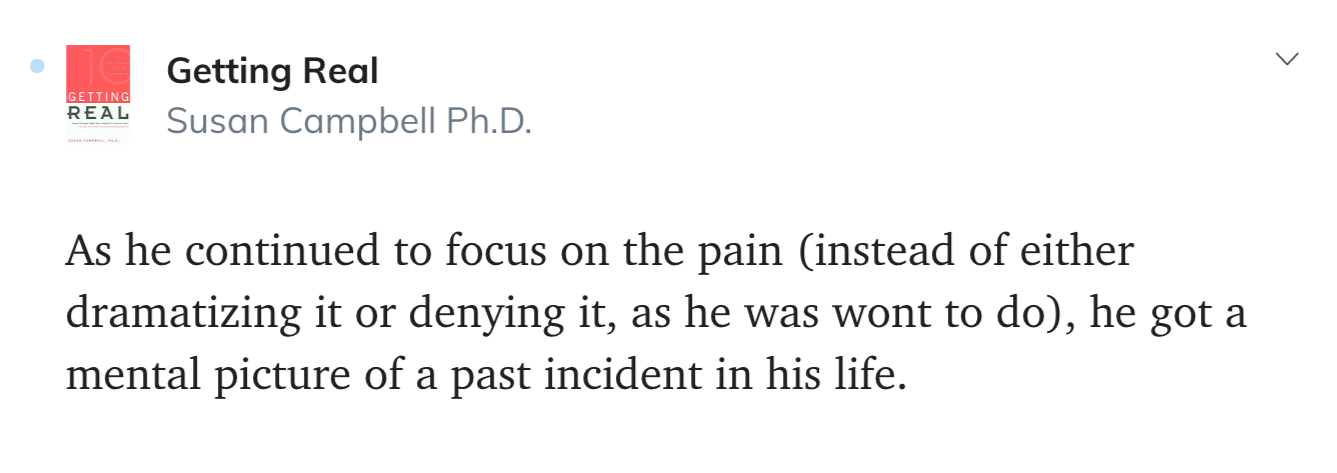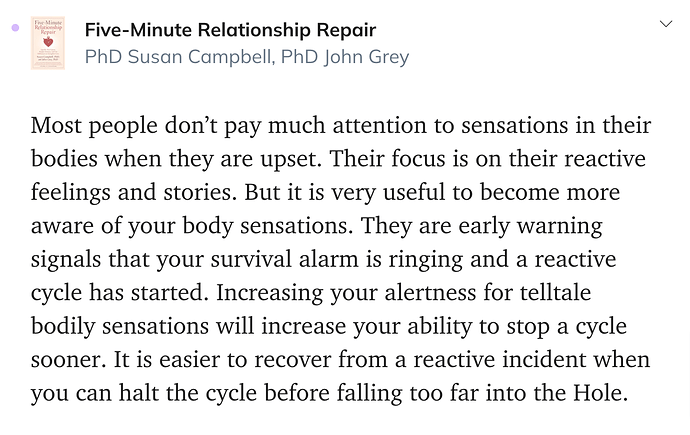I love a good, simple metaphor that further explains one’s point of view but again, I am not understanding the need to “explore and alter the metaphor from inside the metaphor” especially if it was successful in clarifying a point of view. That being said, I look forward to your bringing it to a Circle call ~ Thanks, Glenn
Hi Noreen.
The type of metaphor I’m thinking of is not one that is offered to us by someone else, although that can be a very useful thing…really useful in fact and it is, for me, one of Rick’s many great skills. He often offers a metaphor that will just allow me to perceive in a way that I hadn’t considered before and I really love that experience. It can be profound.
What I’m talking about is a bit different than that. It’s what’s often called an ‘embodied metaphor’…a metaphor that arises naturally out of you from a sensation an emotion or an experience. It’s how we are metaphorically representing an experience.
So if you are having an unpleasant experience regarding a particular situation I could ask “And what is that like?” …and you might respond “It’s like I’m walking in mud up to my knees…I can’t run and I keep feeling like I’m about to fall down.”
That’s a metaphorical representation of the actual experience and we can tap and explore within the realm of that metaphor…explore the metaphorical environment so to speak and not step outside of the metaphor. We aren’t commenting about the metaphor we are exploring from within it.
I might ask “And what kind of mud is that? The colour, the smell etc”
Or I might ask “And what do you see when you look to your right?”…or left or up or down or in front of you.
“Oh, I see a wall right in front of me!”…what’s it made of? How high is it…how wide? How deep into the ground is it?
“And I’m stuck in the mud and can’t get over that wall!”
Etc.
Now the thing is all these aspects of the metaphorical environment have meaning…and not just meaning within the metaphor but literal meaning that is experienced in some way, big or small, in your non-metaphorical (if there is such a thing… :-)) ‘real’ life. These are symbolic representations that have a direct relationship with our real, day to day lives and give things a meaning or a feeling. When someone declares “I’ve got the world on my shoulders” they are speaking a sort of literal metaphor, as I call it. They obviously don’t have the actual world on their shoulders literally BUT they are feeling ‘as if’ they do and it will be literally represented by muscle tension, neck pain, fatigue etc. Or “I’m really feeling down lately.” If we explore the metaphor ‘down’ we shouldn’t be surprised to find a metaphorical representation of it…the person is in a hole or a ‘depression’ within the metaphoric environment and then we can explore the physical qualities of the hole or depression and the environment around those things as well. There are metaphorical clues are all through language and it’s really fascinating to me.
So using our original example of you having an unpleasant experience in a particular situation you may have had the sense that you were ‘stuck’ and ‘unable to move forward’ in the situation that had been problematic for you in real life. So, from the metaphor, ‘stuck’ is represented by the ‘mud up to your knees’ and ‘unable to move forward’ is represented by ‘the wall’ in front of you. Metaphors create experience and experience create metaphors…they’re inextricably intertwined. So if we can ‘get you out of the mud’ and ‘over/around the wall’ from within the metaphor then it’s very likely that you will experience a difference in your ‘real’ life. You will begin to feel less ‘stuck’ and more able to ‘move forward’ in a literal sense.
And while we are exploring the metaphoric environment we can be tapping.
So, that’s the basic idea. There are a number of modalities that use this sort of work with metaphor but I’ve never seen tapping incorporated and it’s always fascinated me to combine the two.
Oooh, I get it…I think! Thanks for explaining. So here’s my question: Would my 9 totem animals with all their inherent meaning be symbolic representations of my own metaphorical environment/skinosphere? (Lol, I have no idea if my question has anything to do with what you’re saying Glenn! Guess that’s why I asked it!!)
Hope is being able to see that there is light despite all of the darkness. _____Desmond Tutu
Sometimes I think I’m keeping secrets from myself.
Margo knows things that you don’t…!!
That’s an interesting question…here’s some thoughts on that off the top of my head. (‘off the top of my head’ is an odd metaphor…!)
My first response would be to say that the totem animals are a sort of external symbolism that you are introducing or adopting into your internal ecosystem/cosmology…they and their symbolism were not unconsciously generated by you. So, to my mind, that would be one thing that would separate them from what the term ‘embodied metaphor’ typical describes.
I would guess that if you were a member of a culture that was millenniums old and the totems were a fundamental and integral part of that culture’s inner and outer life then those animal symbols would take on an unconscious, embodied life.
Now, that doesn’t necessarily mean the totems are without power and influence for someone who doesn’t come from a particular culture where those symbols were deeply embedded but I have to wonder whether they hold the same level of experience shaping power as unconsciously generated metaphors/symbols do. I suppose if you really have internalized them to the point where your unconscious mind identifies with them in a deep way…you have dreams that include them for example…then I suppose they could have the same power and influence as any other embodied metaphor.
It’s an interesting thing to wonder about…thanks Norene.
That’s what I’m afraid of!
I have come up with many metaphors over the years to try and communicate my feelings. Today my metaphor is like being at the ocean and the tide is going in and out. The water pulls back and I run up to it. Then as the water comes back in I run away. The tide is my trauma. I want so badly to get in the water and deal with it, but I get afraid and run. I’m afraid the waves of sorrow will overtake me again.
What am I noticing?
Sensations in the body. Beliefs. Visual Images. Thoughts.
Trauma can make it really hard to feel safe really noticing. Asking the question “What am I noticing?” is self-respecting. It’s saying that what is alive in us MATTERS.
I’ll add that the questions we actually ask make a huge difference. If we ask “Why am I such a failure?” or “Why am I so unhealthy?” we end up creating stories that serve shitty questions. We can ALWAYS come up with a negative story about failures and health. ![]()
It’s why I want to collect more questions here. What are non-why questions that help you gain self-reflective clarity?
How would I treat someone else who went through this?
No surprise, most emotionally sensitive people treat themselves FAR more harshly than they would ever consider treating someone else.
The EFT Tapping might go something like this:
- Even though if this was anyone else, I would feel ____… a part of my is convinced I need to treat myself with ____.
- Even though I treat everyone else with _____ if they were going through this, what if I also am an “everyone” who deserves to be treated with compassion and respect?
- Even though a part of me thinks I am in special need of harsh punishment… that’s what I decided way back when… what if I treat myself the way I’d treat others?
I need to add something here. I am NOT assuming you’d treat others less harshly. Sometimes, what we discover if we ask this question is that is “someone else” did ____ or didn’t _____, we might: be really judgmental, reject them, never want to be around them ever again!
If that is your reactive truth, that’s where you need to tap. Start with the truth about how you feel.
I do recommend getting support when we’re locked in harsh judgment over something we’ve done and cannot find a way on our own towards understanding and compassion.
(Forgiveness is another aspect; I suggest not trying to push that unless it is coming naturally. Start with compassionate understanding.)
This is a doorway into healing. We stay with the body sensations and the question, “What does this remind me of?” and allow our body-mind to bring forward, perhaps (but not always), an association it has made between what’s alive in our body NOW… and a past event.
What do you do when you know there has been trauma, yet you cant access memores related to the trauma - you cant access any details?
Welcome @Truth_Seeker ! Great to have you with us.
Your question reminds me of this quote I saw this morning:
Bodily sensations. Either when you sit with knowing there has been trauma – what happens in your body? Or, you guess that some reaction you have seems like you’re being “triggered” or “reminded of something” (trauma) even though you don’t recall it.
The body sensations are “enough” for tapping to bring unwinding and movement to the trauma. I’ve helped many people whose mind blocked the trauma but their body did not. Our brain does not necessarily store details of every trauma we’ve been through!
Does that help or raise more questions for you?
Thanks a lot Rick… This is a great help…I am a Practioner in training …will tap on sensations. Tattvavidyananda


